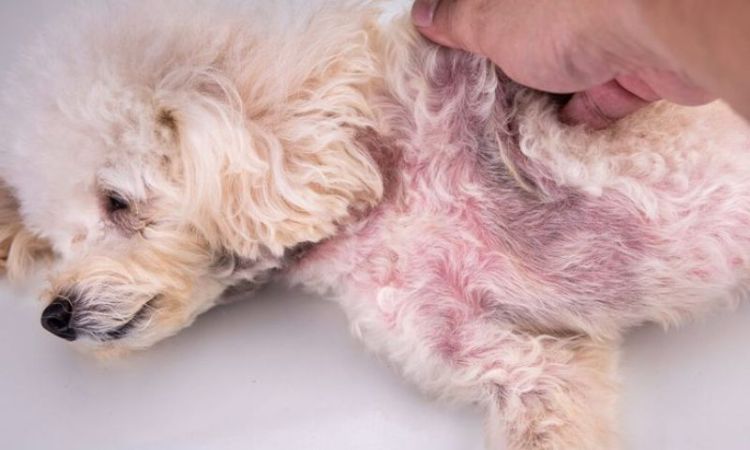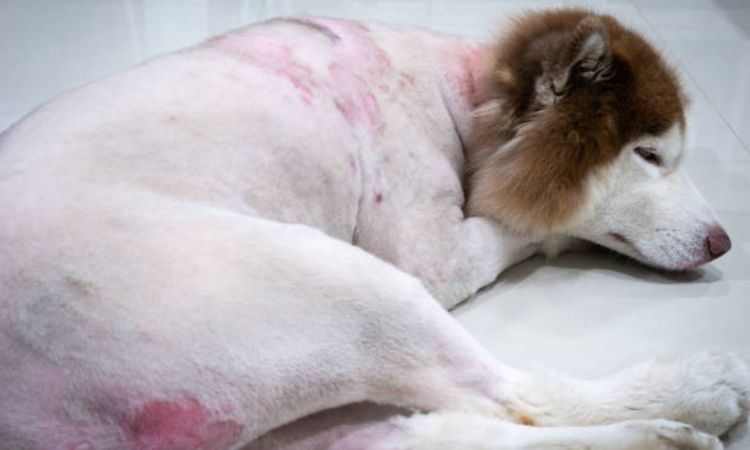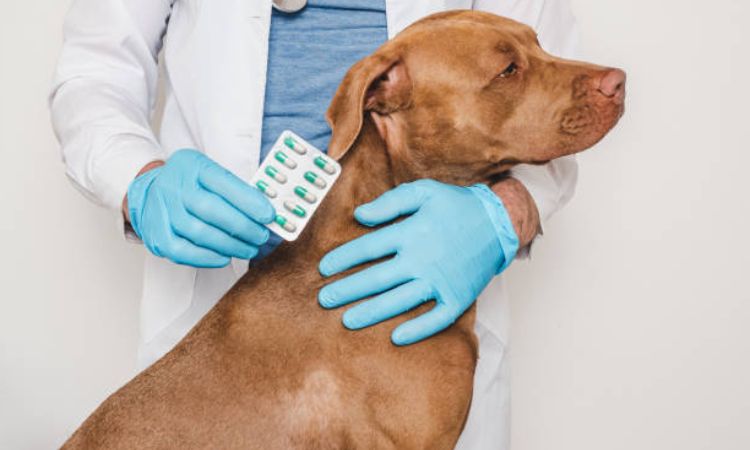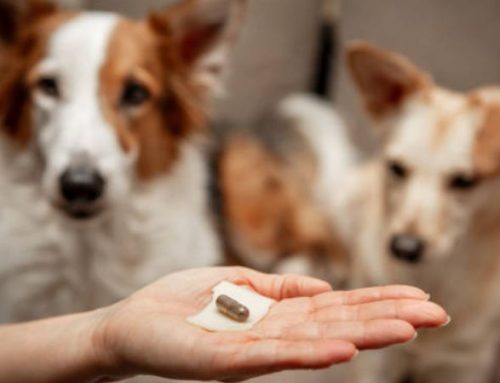Skin allergies are one of the most common issues dog owners face, from persistent itching and redness to flaky patches and chronic inflammation. While traditional treatments like antihistamines or medicated shampoos can provide temporary relief, many pet parents are now turning to a natural, science-backed solution: probiotics.
In this guide, we’ll walk you through the 8 best probiotics specifically for dog skin allergies, explaining how each works, the clinical evidence behind them, and why veterinarians recommend these products for long-term skin support. Whether your dog struggles with seasonal allergies, food sensitivities, or chronic itching, this guide will help you find a safe, effective, and vet-approved solution for happier, healthier skin.

How Probiotics Help Dogs with Skin Allergies
Dogs suffering from skin allergies often experience chronic itching, redness, and inflammation, which can significantly impact their comfort and quality of life. Emerging research and veterinary experience highlight the important role of probiotics in supporting skin health through multiple mechanisms.
1. Connection Between Gut Microbiome and Skin Health
The health of a dog’s skin is closely linked to the balance of microorganisms in the gut. An imbalanced gut microbiome can trigger systemic inflammation and exacerbate allergic reactions, including canine atopic dermatitis (CAD). Probiotics help restore microbial diversity in the intestines, which can reduce the signaling of inflammatory pathways and positively influence skin health.
2. Immune Modulation and Reduction of Hypersensitivity
Probiotics can regulate the immune system by influencing the production of inflammatory molecules, such as IgE antibodies, which are commonly involved in allergic reactions. By modulating immune responses, probiotics may reduce hypersensitivity to environmental allergens, foods, or irritants, resulting in less itching and discomfort for allergic dogs.
3. Anti-Inflammatory Effects of Specific Probiotic Strains
Certain probiotic strains, including Lactobacillus rhamnosus, Bifidobacterium animalis, and Enterococcus faecium, have demonstrated anti-inflammatory properties in canine studies. These strains can help lower cytokine production and systemic inflammation, alleviating symptoms of skin irritation, redness, and swelling associated with allergies.
4. Enhancement of Skin Barrier and Prevention of Infections
A healthy gut microbiome supports the overall integrity of the immune system, which in turn strengthens the skin barrier. Probiotics can reduce the risk of secondary infections caused by scratching or open sores, helping dogs maintain a stronger, healthier coat and preventing complications related to chronic allergic reactions.
By combining gut microbiome support, immune modulation, anti-inflammatory action, and skin barrier reinforcement, probiotics offer a holistic approach to managing skin allergies in dogs. Regular supplementation with dog-specific probiotics can improve both intestinal and dermatological health, making it a valuable tool in comprehensive allergy management.
Top 8 Vet-Approved Probiotics for Dog Skin Allergies
1. Lactobacillus acidophilus – Promotes Healthy Gut Flora and Digestion
Lactobacillus acidophilus is one of the most widely studied probiotics in both humans and dogs, and its benefits extend far beyond the digestive tract. In dogs with skin allergies, this probiotic plays a crucial role in supporting a balanced gut microbiome, which is directly linked to reduced inflammatory responses in the skin. By fostering the growth of beneficial bacteria, L. acidophilus improves nutrient absorption and helps break down food more efficiently, preventing digestive discomfort that can exacerbate allergic reactions. Additionally, it has been shown to reduce intestinal permeability, often referred to as “leaky gut,” which can otherwise allow allergens and toxins to enter the bloodstream and trigger skin irritation. Regular supplementation can therefore not only enhance digestive health but also indirectly calm redness, itching, and other signs of allergic dermatitis.
2. Bifidobacterium animalis – Supports Stool Quality and Gut Lining Integrity
Bifidobacterium animalis is a versatile probiotic strain recommended by veterinarians for dogs prone to food sensitivities and skin inflammation. One of its primary benefits is maintaining healthy stool consistency, which signals a well-functioning digestive system. Beyond digestive support, B. animalis strengthens the intestinal lining, creating a robust barrier that reduces systemic exposure to potential allergens. This barrier function is particularly important in dogs with pruritus, as compromised gut integrity often leads to heightened immune reactions that manifest as itchy, inflamed skin. Research indicates that B. animalis can help balance the immune system, promoting tolerance to environmental and dietary triggers, which contributes to long-term relief from chronic skin irritations.
3. Enterococcus faecium – Restores Balance After Stress or Dietary Changes
Enterococcus faecium is a resilient probiotic commonly recommended for dogs experiencing digestive disturbances following stress, antibiotic treatments, or sudden diet transitions. Its key function lies in re-establishing gut equilibrium by recolonizing the intestinal tract with beneficial bacteria. For dogs with skin allergies, this probiotic is particularly valuable because an imbalanced microbiome can increase systemic inflammation, making the skin more reactive to allergens. Enterococcus faecium helps stabilize the gut environment, thereby indirectly reducing flare-ups of redness, itching, and irritation. Many veterinary formulations, including powders and chews, rely on this strain because of its proven ability to improve gastrointestinal resilience, supporting overall wellness while aiding skin health.

4. Streptococcus thermophilus – Strengthens the Gut Barrier to Reduce Allergen Absorption
Streptococcus thermophilus is a specialized probiotic known for enhancing gut barrier integrity, a critical factor in preventing allergen-induced skin reactions in dogs. By promoting the production of beneficial enzymes and short-chain fatty acids, S. thermophilus not only supports healthy digestion but also fortifies the intestinal lining, making it less permeable to proteins, toxins, and other potential irritants. This protective effect reduces the likelihood of systemic inflammation that often manifests as itching, hair loss, or redness. Additionally, this strain can modulate immune responses, helping dogs tolerate mild allergens more effectively, and works synergistically with other probiotics to maintain a balanced microbiome. For dogs suffering from chronic dermatitis or seasonal flare-ups, S. thermophilus is a reliable addition to any gut-focused skin health protocol.
5. Bifidobacterium longum – Helps Manage Stress-Linked Allergy Flare-Ups
Bifidobacterium longum is highly valued by veterinarians for its ability to regulate the immune system while calming gastrointestinal disturbances that often accompany stress. In dogs prone to skin allergies, periods of anxiety, environmental changes, or travel can trigger flare-ups of redness, itching, and irritation. Supplementation with B. longum strengthens the gut-brain-skin axis, helping to modulate cortisol levels and prevent stress-induced inflammatory responses. By promoting a stable and balanced intestinal environment, this probiotic reduces the frequency and severity of allergic reactions linked to emotional or environmental triggers. Many clinical studies also indicate that it can enhance mucosal immunity, supporting the body’s natural defense against pathogens that might exacerbate dermatitis.
Related Reads: Best probiotic for dogs gut health
6. Lactobacillus casei – Improves Nutrient Absorption and Immune Response
Lactobacillus casei is a versatile probiotic that excels in optimizing digestion and bolstering the immune system, both of which are essential for dogs with chronic skin conditions. This strain promotes the breakdown and assimilation of nutrients, ensuring that essential fatty acids, zinc, and vitamins critical for maintaining healthy skin—are efficiently absorbed. Furthermore, L. casei plays a key role in modulating immune responses, reducing hypersensitivity to allergens that commonly trigger itching and redness. For dogs suffering from seasonal allergies or food sensitivities, integrating L. casei into their diet can create a smoother, more resilient gut environment, which directly contributes to calmer, less inflamed skin over time. Its effectiveness is often enhanced when combined with complementary probiotics or prebiotics in veterinary-formulated products.
7. Lactobacillus plantarum – Reduces Redness and Puffiness in Irritated Skin
Lactobacillus plantarum is particularly recognized for its anti-inflammatory properties and ability to support skin health by regulating the gut microbiome. In dogs with itchy or inflamed skin, L. plantarum produces bioactive compounds that help neutralize oxidative stress and reduce systemic inflammation, which can otherwise exacerbate redness, swelling, and discomfort. This strain also contributes to strengthening the gut lining, preventing allergens from entering the bloodstream and triggering dermatological reactions. For pet owners, L. plantarum is an excellent probiotic to incorporate into a comprehensive skin-care regimen, especially when paired with natural remedies such as omega-3 fatty acids or topical soothing agents like coconut oil and oatmeal baths.
8. Lactobacillus rhamnosus – Supports Seasonal Allergy Response and Digestion
Lactobacillus rhamnosus is one of the most widely recommended probiotics for dogs suffering from seasonal allergies or intermittent skin flare-ups. Its dual action on both digestive health and immune regulation makes it highly effective for controlling pruritus, redness, and inflammation triggered by environmental allergens such as pollen, dust, or mold. L. rhamnosus enhances gut microbiota diversity, which in turn stabilizes immune reactions and helps prevent overactive responses to harmless antigens. Additionally, it aids in improving nutrient absorption, supporting the skin barrier and overall resilience. Many veterinarians prefer L. rhamnosus for long-term supplementation because it is well-tolerated, palatable, and compatible with other probiotics or dietary interventions aimed at promoting healthy skin.
Tips for Managing Dog Skin Allergies Alongside Probiotics
Managing dog skin allergies effectively requires combining probiotics with smart diet choices, natural remedies, and medical support. Probiotics help restore gut balance, reduce inflammation, and improve immune response, while complementary strategies target triggers and relieve symptoms.
1. Dietary Modifications and Hypoallergenic Diets
Nutrition plays a key role in reducing allergy flare-ups:
- Eliminate common allergens: Beef, chicken, dairy, soy, wheat, and corn often trigger skin reactions.
- Include anti-inflammatory nutrients: Omega-3 fatty acids from fish oil, flaxseed, or algae reduce redness and support skin barrier health.
- Add antioxidant-rich foods: Vegetables like spinach, kale, and carrots provide essential vitamins to strengthen the immune system and aid skin repair.
- Support nutrient absorption with probiotics: Strains like Lactobacillus acidophilus and Bifidobacterium animalis help the gut digest nutrients more effectively and reduce immune overreactions.
Tip: For dogs with severe sensitivities, a vet-guided elimination diet ensures safe and effective results.
2. Natural Remedies and Supplements
Alongside probiotics, natural interventions can soothe skin and relieve itching:
- Coconut oil: Moisturizes and provides antifungal properties. Can be applied topically or added in small amounts to food.
- Oatmeal baths: Calm inflamed skin and reduce scratching.
- Aloe vera & Calendula: Sprays or rinses reduce redness, swelling, and promote healing.
- Supplements: Quercetin, turmeric, and prebiotic fibers further modulate the immune system and improve gut health.
- Synergy with probiotics: Combining these remedies with strains like Lactobacillus rhamnosus or Bifidobacterium longum enhances the reduction of skin flare-ups.

3. Medical Treatments Complementing Probiotics
In more severe or persistent cases, veterinary interventions may be necessary:
- Antihistamines: Diphenhydramine (Benadryl) or natural antihistamines help control acute itching.
- Targeted therapies: Monoclonal antibodies like lokivetmab (Cytopoint) address immune system causes of pruritus.
- Topical treatments: Medicated shampoos with oatmeal, chlorhexidine, or aloe vera reduce bacteria/yeast overgrowth and prevent infections.
- Short-term anti-inflammatories: Corticosteroids may be used under veterinary supervision for severe flare-ups.
Combining these with probiotics helps address both symptoms and underlying causes, supporting long-term skin and gut health.
Probiotics offer a powerful, science-backed way to support dogs struggling with skin allergies by restoring gut balance, reducing inflammation, and strengthening the immune system. When paired with thoughtful dietary choices, natural remedies, and veterinary-guided treatments, these beneficial microorganisms can significantly ease itching, calm flare-ups, and improve overall skin health. Selecting the right probiotic strains and integrating them into a comprehensive care plan ensures lasting comfort, promotes digestive wellness, and empowers pet owners to proactively manage allergic reactions in their dogs.






